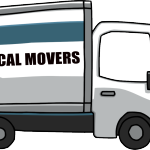 You should be aware that moving companies are required by law to give you a written, not oral, estimate before anything is loaded onto the moving van, but this estimate is void if even one more box or item is added to the original number. In such a case, you must get a new estimate and moving order, which must be signed by the movers and the customer in order to ensure your rights. It is also important to have the pick up and delivery dates on the documents.
You should be aware that moving companies are required by law to give you a written, not oral, estimate before anything is loaded onto the moving van, but this estimate is void if even one more box or item is added to the original number. In such a case, you must get a new estimate and moving order, which must be signed by the movers and the customer in order to ensure your rights. It is also important to have the pick up and delivery dates on the documents.
You will also need a list of your inventory, which describes what each item is and its condition. If you discover that any of your household goods were damaged, this inventory list will help prove your claim. Fill out a claim report and send it by certified mail to the moving company within nine months, or else your claim could be rejected because too much time has passed. If you have a complaint you can call the Federal Motor Carrier Safety Administration (FMCSA) at (888) 368-7238 or the Surface Transportation Board at (866) 254-1792 if you believe that you were charged too much. The FMCSA does not have the authority to solve your issue, but they can advise you and give you names and numbers of resources to help you resolve the claim. The web site called protectyourmove.com has a list of moving companies that are registered with FMCSA
Insurance for your personal property can be purchased, but check first to see what level of liability the insurance will have. In most cases, the mover will replace or reimburse you for the cost of items that were damaged or lost during the move. This is known as Full Value Protection. However, you must read the fine print before you decide which type and amount of insurance coverage you are paying for. There is a free insurance option available, which is called Released Value insurance. This coverage will reimburse you for up to 60 cents per pound for each article. It is important to note that any shipment not specifically covered by a Released Value policy will have Full Value Protection.









